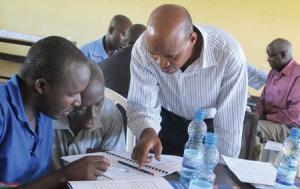Rwanda is an ambitious country, aiming to transform itself into a middle income country with a knowledge-based and ICT-led economy by 2020. For such an agenda, there is an urgent need for productive citizens, people who have the right skills for the market, who are innovative, communicative, and poised to solve new problems in a rapidly changing world.


Rwanda is an ambitious country, aiming to transform itself into a middle income country with a knowledge-based and ICT-led economy by 2020. For such an agenda, there is an urgent need for productive citizens, people who have the right skills for the market, who are innovative, communicative, and poised to solve new problems in a rapidly changing world.
In November 2013, a national consultative curriculum conference, aimed at mapping out a way forward for an ongoing process to reform the pre-primary, primary, and secondary curricula was held, which was meant to usher in reforms that ensure that the education system is equipping students with the skills and competencies demanded in the labor market, required for Rwanda’s development goals, particularly for fulfilling Vision 2020 and EDPRS II.
The new curriculum, which will be competency-based, will emphasize general, transferable skills required for participation in today’s market. Students will acquire these skills incrementally from preprimary to secondary education within all subject areas.


